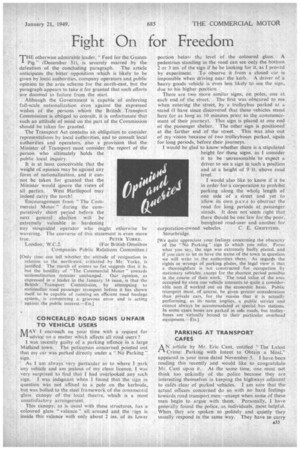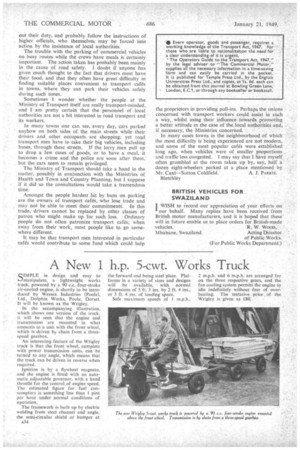Fight On for Freedom
Page 23

Page 24

If you've noticed an error in this article please click here to report it so we can fix it.
THE otherwise admirable leader, Feed for the Guinea Pig " (December 31), is severely marred by the defeatism of the concluding paragraph. The article anticipates the bitter opposition .which is likely to be given by local authorities, company operators and public opinion to the area scheme for the north-east, but the paragraph appears to take it for granted that such efforts are doomed to failure from the start.
Although the 'Government is capable of enforcing full-scale nationalization even against the expressed wishes of the persons whom the British Transport Commission is obliged to consult, it is unfortunate that such an attitude of mind on the part of the Commission should be taken for granted.
The Transport Act contains an obligation to consider representations by local authorities; and to consult local authorities and operators; also a provision that the Minister of Transport must consider the report of the person who ultimately holds the
public local inquiry.
It is at least conceivable that the weight of opinion may be against any form of nationalization, and it cannot be taken for granted that the Minister would ignore the views of
all parties. West Hartlepool may indeed carry the torch?
Encouragement from "The Com
mercial Motor " during the COMparatively short period before the next general election will be extremely valuable in hardening any misguided operator who might otherwise wavering. The converse of this statement is even more true. PETER YORKE.
London, W.C.2. (For British Omnibus
be
er":0
Companies Public Relations Committee.)• [Only time can tell whether the attitude of resignation in relation to the north-east, criticized by Mr. Yorke. is justified. The march of events so far suggests that it is, hut the hostility of "The Commercial Motor " towards nationalization remains. unchanged. Our opinion, as expressed in a leader in the January 14 issue, is that the British _ 'Transport Commission, by attempting to nationalize road passenger transport before it has shown itself to be capable of running an efficient road haulage system, is committing a grievous error and is acting against the public interest.—ED.1
CONCEALED ROAD SIGNS UNFAIR
TO VEHICLE USERS MAY I encroach on your time with a request for ATI advice on a matter which affects all road users ?
I was recently guilty of a parking offence in a large Midland town. The policeman concerned pointed out that toy car was parked directly under a " No Parking" sign.
As I am always very particular as to where I park any vehicle and am jealous of my clean licence, I was very surprised to find that I had overlooked any such sign. " I was indignant when I found that the sign in question was, not affixed to a pole on the kerbside, but was bolted to the steel framework of the ornamental glass canopy of the local theatre, which is a most unsatisfactory arrangement.
This canopy, as is usual with these structures, has acoloured glass " valance " all around and the rign is inside this valance with only about 2 ins, of its lower
portion below the level of the coloured glass. A pedestrian standing in the road can see only the bottom 2 or 3 ins, of the sign if he be looking for it, as I proved by experiment. To observe it from a closed car is impossible when driving near the kerb. A driver of a heavy goods vehicle is even less likely to see the sign, due to his higher position.
There are two more similar signs, on poles, one at each end of the street. The first was obscured to me when entering the street, by a tr011eybus parked at a stand (I have since discovered that these vehicles stand here for as long as 10 minutes prior to the commencement of their journey). This sign is placed at one end of the passenger shelter. The other sign is positioned at the farther end of the street. This was also out of my vision because of two trolleybuses parked, again for long periods, before their journeys.
I would be glad to know whether there is a stipulated height for these signs, as 1 consider it to be • unreasonable to expect a driver to see a sign in such a position and at a height of 9 ft. above road level.
I would also like to know if it be in order for a corporation to prohibit parking along the whole length of one side of a street and yet to 'allow its own p.s.V.s to obstruct the road for long periods at passenger stands. It does not seem right that there Should be one law for the poor, benighted road-user and another for
corporation-owned vehicles. C. E. GRIFFITHS. Stourbridge.
[We quite appreciate your feelius concerning the obscurity of the "No Parking" sign to which you refer. From what you say, the sign was extremely badly placed, and if you care to let us have the name of the town in question we will write to the authorities there. As regards the rights or wrongs of parking places, the legal view is that a thoroughfare is not constructed for occupation by stationary vehicles, except for the shortest period possible in the course of their work. The road value of the area occupied by even one vehicle amounts to quite a considerable sum if worked out on the economic basis. Public transport must, of course, be given greater consideration than private cars, for the reason that it is actually performing, as itsname implies, a public service and cannot always be accommodated at special bus stations. In some cases buses are parked in side roads, but trolleybuses are Virtually bound to their particular overhead eauipment.—Eo.]
PARKING AT TRANSPORT CAFES
A N article by Mr. Eric Cant, entitled "The Latest -1-1 Crime: Parking with Intent to Obtain a Meal," appeared in your issue dated November 5. I have been reading this recently and would like to congratulate Mr. Cant upon it.. At the same time, one must not think too unkindly of the ,police because they are interesting themselves in keeping the highways adjacent to cafés clear of parked vehicles. I am sure that the actual officers concerned do so with no hard feelings towards road transport men—except when some of these men begin to argue with them. Personally. I have generally found the police, as individuals, most helpful. When they are spoken to politely and quietly they usually respond in the same way. They have to carry
out their duty, and probably follow the instructions of higher officials, who themselves may be forced into action by the insistence of local authorities.
The trouble with the parking of commercial vehicles on busy routes while the crews have meals is certainly important. The action taken has probably been mainly in the cause of road safety. I doubt if anyone has given much thought to the fact that drivers must have their food, and that they often have great difficulty in finding suitable places convenient to transport cafés in towns, where they can park their vehicles safely during such times.
Sometimes I wonder whether the people at the Ministry of Transport itself are really transport-minded, and I am pretty certain that the personnel of local authorities are not a bit interested in road transport and its workers.
In many towns one can see, every day, cars parked anyhow on both sides of the main streets while their drivers and other occupants are shopping; yet road transport men have to take their big vehicles, including buses, through these streets. If the lorry men pull up to drop a few cases of goods, or to have a meal, it becomes a crime and the police are soon after them, but the cars seem to remain privileged.
The Ministry of Transport should take a hand in the matter, possibly in conjunction with the Ministries of Health and Town and Country Planning, but I suppose if it did so the consultations would take a tremendous time.
Amongst the people hardest hit by bans on parking are the owners of transport cafes, who lose trade and may not be able to meet their commitmentS. In this trade, drivers cannot be replaced by other classes of patron who might make up for such loss. Ordinary people do not often patronize transport cafés; when away from their work, most people like to go somewhere different.
It may be that transport men interested in particular cafés would contribute to some fund which could help the proprietors in providing pull-ins. Perhaps the unions concerned with transport workers could assist in such a way, whilst using their influence towards promoting a better attitude in the case of the local authorities and if necessary, the Ministries concerned.
In many cases towns in the neighbourhood of which the most difficulty is being experienced are not modern, and some of the most popular cafes were established long ago, when vehicles were of smaller proportions and traffic less congested. I may say that I have myself often grumbled at the room taken up by, say, half a dozen eight-wheelers parked at a place mentioned by Mr. Cant—Sutton Coldfield. A. J. PARR/S. Bletchley
BRITISH VEHICLES FOR SWAZILAND WISH to record our appreciation of your efforts on 'our behalf. Many replies have been received from British motor manufacturers, and it is hoped that these will in future enable us to place orders for British-made
vehicles. R. W. Woot.),
Mbabane, Swaziland. Acting Director of Public Works.
(For Public Works Department.)




























